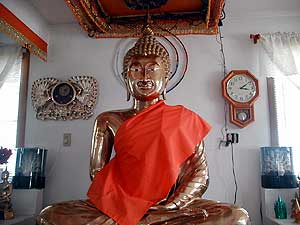|
Audio
Photos
Your Voice
|
Farmers question temple plan
February 22, 2004
 |
| The Laotian Buddhists have spent $41,000 remodeling the house. They've installed a statue of Buddha inside. (MPR Photo/Mark Steil) |
Worthington, Minn. — Laotians have lived in southwest Minnesota since the 1970's. Most fled their native land after the communist takeover. Bounlome Soumetho is one. The Worthington resident is busy working and raising a family. He's also president of the local Buddhist organization. The group bought a farmhouse near town last year. Soumetho sees the outline of a Buddhist temple in the bones of the old building.
"We would like to make this place a fancier temple and learn about religion," says Soumetho.
The group has spent $41,000 remodeling the building. Inside is a statue of Buddha. They've also cleaned up the land. Soumetho says the group hauled away abandoned refrigerators, television sets and other debris. He says they enjoyed it, even though it took a lot of time.
 | |||
"Nine weeks exactly. So we have a lot of fun, we have a lot of work," says Soumetho. "Old, young people they come, men and woman. Every kind of people they come to help."
The Buddhists had to fight to get county approval for the temple. Nobles County has zoning laws covering the farmland which dominates the area. It's a way to regulate development. Farmers must get permission if they want to put up a hog barn. And a religious organization must get county approval if they want to locate a church in a rural area. The county rejected the temple plan the first time they voted on it, but approved it the second. Nearby farmers like Joel Lorenz are against the idea to transform the house into a temple.
"Lutheran church, Baptist church, Catholic church whatever church would want to build out there, that is not a place for any church. And I would oppose any church going out there. It's nothing to do with what religion it is," says Lorenz.
He says traffic is the problem. The proposed temple is on a dead end gravel road. Lorenz says farmers regularly drive tractors, combines and trucks on it. He says in most cases there's not enough room for two way traffic.
 | |||
"It's a safety concern," says Lorenz. "Semi's using that road in the fall is very dangerous. It's an accident waiting to happen in my opinion."
The Buddhists say they're aware of the traffic concerns. They promise not to park on the road. They will alert neighbors and law enforcement officials if unusually heavy traffic is expected. The county will also review the temple's permit in two years. The dispute over the temple is an example of the kinds of farmland disagreements happening all across the state. Bob Patton of the state Agriculture Department says it's most noticeable on city fringes but takes place everywhere.
"There are a lot of counties that are interested in making sure their economy continues to thrive and that includes their agricultural economy," says Patton.
Counties use zoning laws and other tools to limit development which interferes with farm operations. Farmers like those measures. But most counties also have laws to protect non-farmers living in rural areas. Laws which limit how many livestock can be raised at a feedlot, or how close that feedlot can be to neighbors. Patton says farmers don't always like that side of the push to control rural development.
 | |||
"County officials recognize they have a responsibility to make sure their citizens are protected and the environment is protected," says Patton.
It's a balancing act designed to please everyone but sure to leave some dissatisfied. The Worthington farmers believe approving the temple will set a precedence for more organizations to locate in the country. Buddhist leader Bounlome Soumetho thinks with proper caution there is enough room in rural Minnesota for everyone.
"We have to protect our land, our natural resources. We have to protect everything that belongs to the world."
The Buddhists will have an opportunity to put the philosophy into action at their new temple near Worthington. Farmers will be watching how well it works. In this debate over farming and religion, all sides hope their prayers are answered.
|
News Headlines
|
Related Subjects
|
